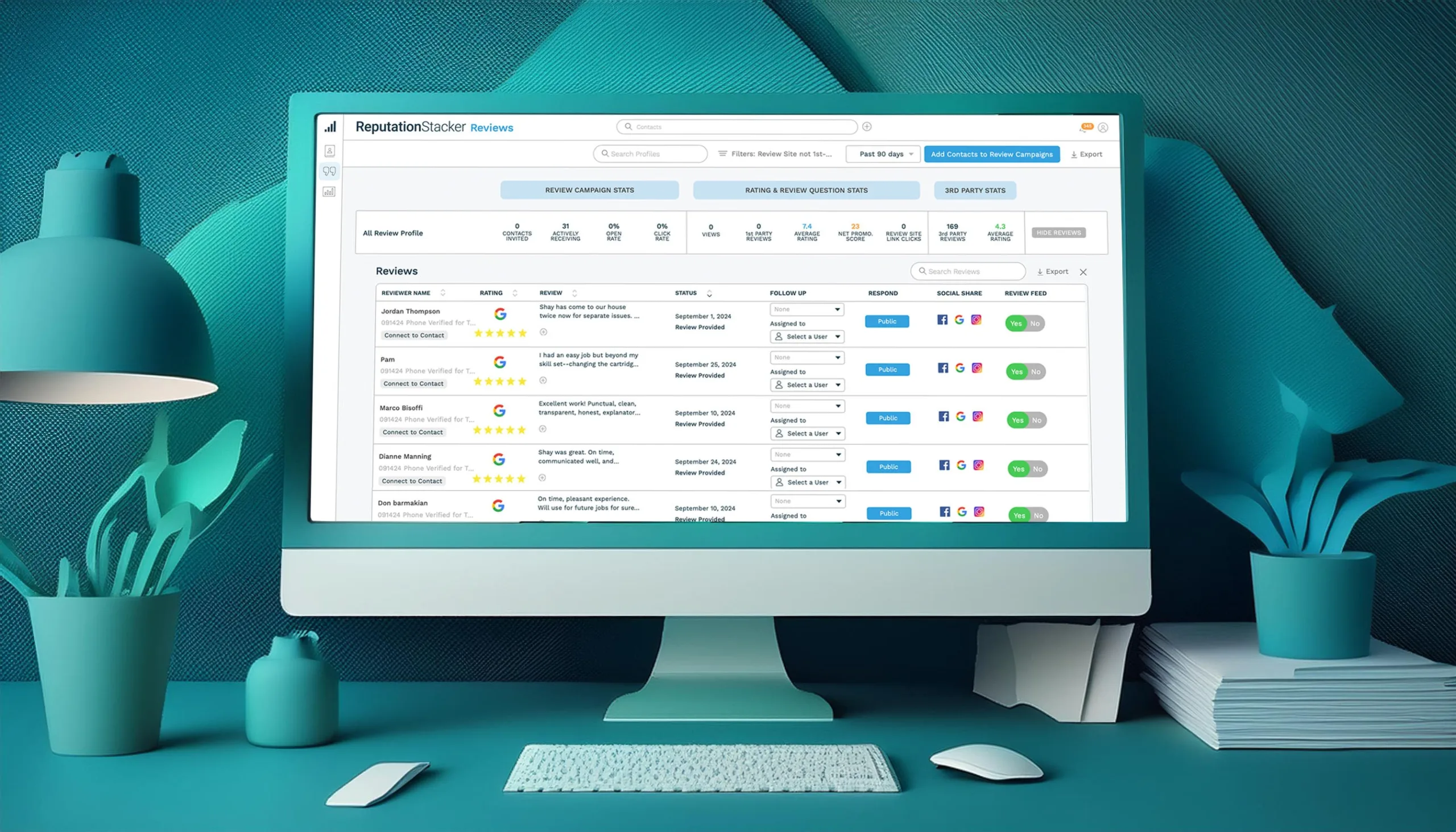For businesses, online reputation management is more important than ever.
There are a host of factors that can affect a business’s reputation in an instant, all due to the internet and how accessible information has become.
This makes it important to not only be aware of these factors, but to proactively manage them.
Your business’s online reputation ultimately boils down to one thing: what customers think of your business – its legitimacy, trustworthiness, professionalism, and how it deals with its customers.
This guide looks at the main factors that can affect a business’s online reputation.
But first, let’s make sure we’re clear on exactly what goes into your online reputation…
Understanding Online Reputation

What is Online Reputation and Why is it Vital for Business?
Online reputation refers to the perception of a business or individual in the digital world.
It encompasses everything from the information available about a business on the internet to how others interact with it on social media platforms.
A business’s online reputation is vital for its success, as it directly influences its credibility, trustworthiness, and overall image in the online world.
In today’s digitally-driven world, a business’s online reputation can make or break its success.
With the increasing use of social media and online review platforms, customers can easily share their experiences with others.
Potential customers often rely on these reviews and ratings to make informed decisions about whether or not to do business with a company.
A good business reputation can directly impact a business’s income by attracting new customers, retaining existing ones, and increasing revenue.
Now that we’re clear on the importance of managing your online reputation, let’s look at the main factors that affect it.
1. Customer Reviews

Online reviews, which are real-life testimonials of a customer’s experience with a business, can make or break a business’s reputation.
Simply put, positive reviews inspire trust while negative reviews will send customers in the opposite direction.
Even a simple opinion that is shared online, whether it’s a Tweet, forum post, or social media comment, can boost or harm a business’s online reputation!
If you don’t have a review management strategy in place, then don’t expect your customers to write reviews.
If you want reviews, you have to ask your customers for them.
Many businesses use reputation management software like ReputationStacker to help them get reviews on auto-pilot.
No matter what, don’t buy reviews or otherwise engage in fake reviews.
These can be more damaging to your business’s online reputation than negative customer reviews.
2. Website Design

A business’s website is essentially its online HQ, serving to represent that business and what it offers.
Factors include the visual design, functionality, and messaging – all of which need to engage visitors.
Have you ever visited a business website that was poorly designed, slow to load, and hard to navigate? There’s a good chance that you left to look elsewhere. Needless to say, this isn’t good for a business’s online reputation.
Bad website design can be a sign that a business isn’t professional, successful, or simply doesn’t care about how it’s perceived by customers.
Due to this, website design should be well thought out and (ideally) designed in collaboration with professionals, or at least with someone who has an eye for good design.
As one of the main factors reflecting your business’s online reputation, your website should be welcoming and informative as well as easy to navigate, fast to load, and responsive across all devices.
3. Search Engine Optimization (SEO) and Online Visibility

Search Engine Optimization (SEO) is a crucial aspect of online reputation management (ORM).
It involves optimizing you website and its content to rank higher in search engine results pages (SERPs), making it more visible to potential customers.
A strong online presence is essential for building a positive online reputation, and SEO plays a significant role in achieving this.
By optimizing your website with relevant keywords, quality backlinks, and a user-friendly design, you can improve your ranking on search engines like Google.
This, in turn, increases your online visibility, making it more likely for potential customers to find and engage with your business.
A strong online presence also enhances a business’s credibility and trustworthiness, making it more likely to attract new customers and retain existing ones.
Moreover, SEO helps businesses to manage their online reputation by allowing them to control the narrative around their brand.
By creating high-quality, relevant content that aligns with their audience’s interests and needs, businesses can establish themselves as experts in their field and build trust with their target audience.
This, in turn, can lead to an increase in positive reviews (which helps increase conversion rates), social media engagement, and overall online reputation.
SEO is a vital component of managing your online reputation.
By optimizing your website and content for search engines, you can improve your online visibility, credibility, and trustworthiness, ultimately leading to a stronger online reputation and increased business success.
4. Social Media Presence

This is an important point: a good online reputation is not measured by how large a business’s social media following is, but how that business engages with its customers.
We don’t have to tell you how popular social media is, so these platforms shouldn’t be ignored as tools for growing your business’s online reputation.
In addition to being “secondary websites”, social media platforms are outlets to get creative and help build your brand.
Posts, competitions, campaigns – all of these can create a buzz around a brand to engage customers and improve reach, and build your business’s reputation.
But on the other end of the spectrum, businesses that are on social media but do not post consistently can come across as lazy or apathetic.
“Abandoned” social media pages with posts and customer reviews that are years old can even generate doubt as to whether a business is still in operation.
If you’re going to do the social media thing, make sure you’re active on the platforms that matter most to your customers.
5. Review Responses

Customer reviews are arguably the most important factor for legitimizing a business’s reputation.
What’s just as important, however, is how a business responds to its customers’ reviews.
56% of customers say a company’s response to a review changed their perspective on the business.
And the tone and message your responses convey can either build rapport or be a warning sign for bad customer service.
Needless to say, review responses should be professional and timely, and never defensive or dismissive where negative feedback is concerned.
Many businesses do not respond to customer reviews – or only choose to respond to negative reviews.
Responding to all your reviews not only shows customers that you care, review responses also help SEO.
Online reputation management tools like ReputationStacker makes responding to all of your reviews as easy as a few clicks.
6. Star Rating

Last but not least, star rating.
Star ratings are everywhere: on Google, Facebook, Yelp, TripAdvisor, Trustpilot – they’re simply hard to avoid, and serve as a universally understood rating for whether or not a business delivers on its promises.
If you think about it, there’s no clearer indication of a business’s online reputation than the star ratings it has earned on the most important review sites.
After all, a business’s star rating is generated by the customer reviews it has received, and customer opinions are hard to refute.
A low star rating typically indicates a poor online reputation – it’s as simple as that.
But don’t fret if you have a few bad reviews. In fact, having a less than perfect star rating is actually better for business than having a perfect 5-star rating.
The Conclusion? Customer Reviews Build Your Online Reputation

You may have caught on that three of the main factors listed above involve customer reviews.
This isn’t a coincidence as these days a business’s reputation is largely determined by their online reviews.
Online reviews are the new word of mouth – essentially free marketing.
But like all the above factors, reviews need managing – especially if you want to grow the best possible online reputation for your business.
How do you manage the customer reviews you receive, and how do you get more of them on a consistent basis?
Reputation management software like ReputationStacker was specifically built to remove the burden of review collection and management for businesses like yours.
If you’ve been hunting for the quickest, most effective way to organically build your business’s online reputation, this is it.
Frequently Asked Questions About The Factors That Influence Online Reputation
What are the key factors that influence online reputation?
The key factors that affect your online reputation include online reviews, customer satisfaction, social media presence, and consistent brand identity.
How do online reviews impact a company’s online reputation?
Good reviews improve a company’s online reputation, while negative reviews can damage it, affecting potential customers’ perceptions. Reviews also play a significant role in local SEO, as does responding to reviews.
What role does customer satisfaction play in online reputation management?
High customer satisfaction typically leads to good reviews and strong brand loyalty, strengthening the company’s online reputation.
How can a strong social media presence affect a brand’s reputation?
A strong social media presence allows for direct engagement with customers, enabling businesses to showcase excellent customer service and manage customer feedback to help improve your business.
What is the importance of managing negative reviews?
Responding to negative reviews promptly can mitigate damage to a company’s online reputation and demonstrate a commitment to customer satisfaction.
How does a company’s reputation influence potential customers?
A positive reputation builds trust, encouraging potential customers to choose a brand over its competitors.
What are effective strategies for online reputation management?
Online reputation strategies include tracking your online reviews, engaging with customers on social media, and promoting positive brand messaging. Many reputation management guides recommend using reputation management software like ReputationStacker to improve your online reputation.
How do customer experiences shape a company’s online reputation?
Positive customer experiences often lead to positive feedback, while negative experiences can result in detrimental reviews and a weakened reputation.
What impact do marketing campaigns have on brand reputation?
Successful marketing campaigns can enhance a positive brand image and reinforce brand values, contributing to a strong online reputation.
Why is customer feedback important for reputation management?
Customer feedback provides valuable insights into areas for improvement and helps businesses align with customer expectations. Many businesses use a customer feedback system to make getting and managing customer feedback easy, helping them to grow their business.
How can social media marketing influence online reputation?
Social media marketing can amplify good reviews and help build customer engagement, ultimately improving the brand’s online reputation.
What is the significance of maintaining a cohesive brand image?
A consistent and cohesive brand image across online platforms helps build trust and strengthens the overall brand reputation.
How does crisis management relate to online reputation?
Effective crisis management can mitigate potential damage to a brand’s reputation during negative incidents and maintain customer trust. But when it comes to crisis management, the best defensive is a good offense. Getting a steady stream of online reviews from your customers can greatly soften the blow when a crisis happens.
How can businesses leverage positive reviews?
Promoting positive reviews on various online platforms can enhance brand perception and attract new customers. Customer review software like ReputationStacker makes it easy to share your reviews on social media.
What factors contribute to a strong online reputation?
Factors that contribute to a strong online reputation include excellent customer service, positive reviews, a solid social media presence, and effective reputation management practices.
How do brand mentions on social media affect online reputation?
Frequent positive brand mentions can help a company’s reputation, while negative mentions may harm it, affecting overall brand perception.
How does customer loyalty impact a business’s online reputation?
Loyal customers often leave positive feedback and advocate for the brand, contributing to a positive online reputation.
What is the relationship between brand values and online reputation?
Aligning business practices with strong values can help build a positive brand reputation and enhance customer trust.
How do search engine rankings influence online reputation?
Higher search engine rankings often lead to increased visibility and credibility, positively impacting a company’s reputation online. SEO reputation management is an important part of an overall online reputation management strategy.
What is the role of online security in maintaining a positive reputation?
Ensuring secure transactions and protecting customer data is crucial for building trust and maintaining a positive online reputation.

